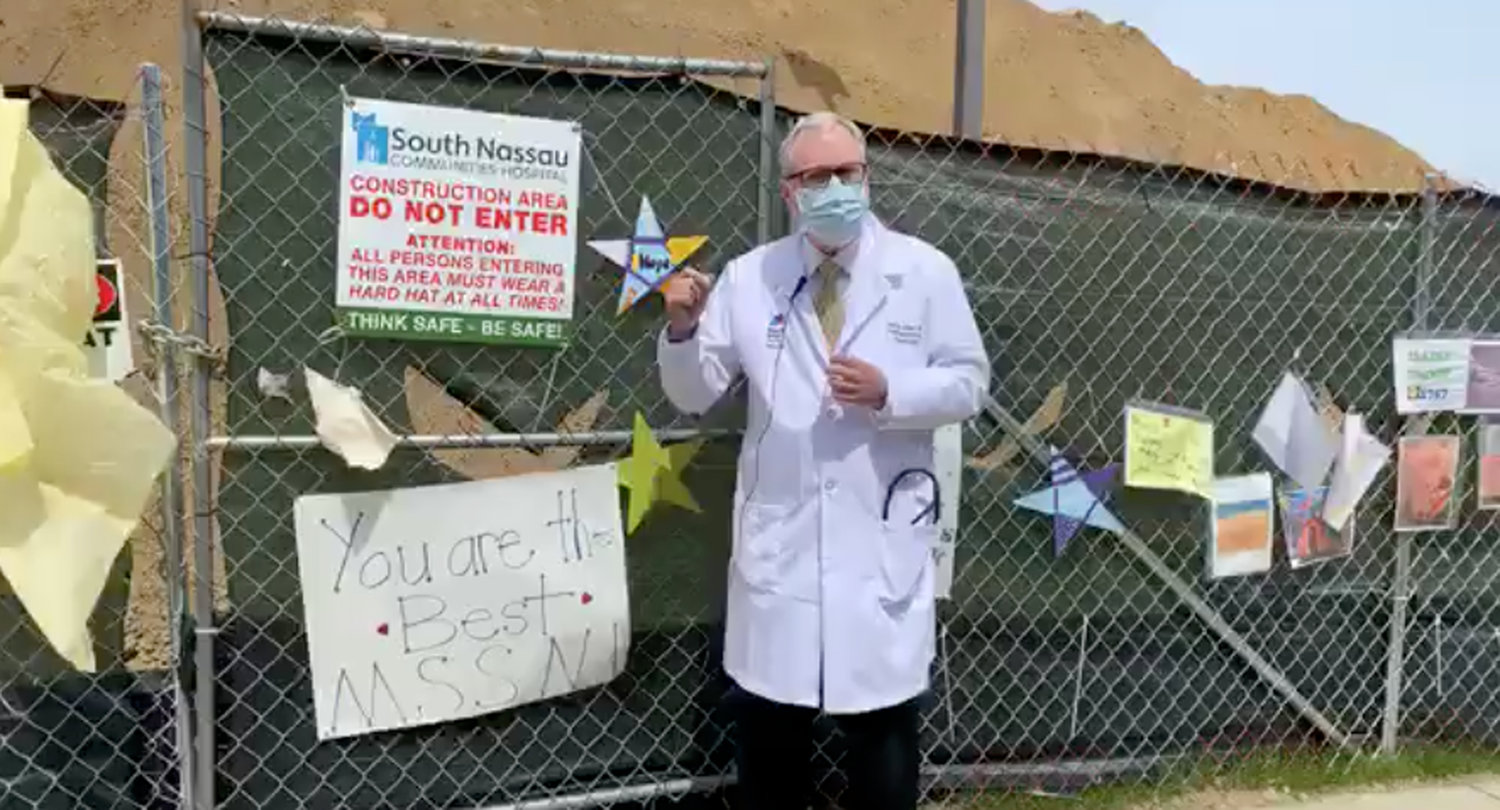Antibody treatment offers ray of hope at MSSN
People have been pinning up homemade signs thanking the many workers at Mount Sinai South Nassau in Oceanside on chain-link fence that blocks off a construction project full of big dirt mounds outside the hospital.
It was, one could say, a fitting site for a recent Facebook Live session in which three hospital officials offered a glimmer of hope amid the coronavirus crisis, speaking at length about an “innovative” treatment called convalescent plasma that, for some at least, might help cure Covid-19.
Joe Calderone, MSSN’s senior vice president for communications, led the talk on April 17 with Dr. Aaron Glatt, the hospital’s chief of infectious diseases and chairman of the Department of Medicine, and Dr. Adhi Sharma, its chief medical officer and vice president for clinical and professional affairs.
Sharma noted that convalescent plasma is an investigational treatment, not yet fully approved by the federal Food and Drug Administration.
It works like this, according to Glatt: Patients develop antibodies when fighting off Covid-19, as they do with other viruses. Those antibodies can be extracted from a recovering patient with a high level of them through a blood draw. The plasma can then be injected into someone who is still fighting off the coronavirus, which should help the patient battle the illness.
As of April 17, doctors at the hospital had given plasma to 15 patients, and in those preliminary cases, the procedure had demonstrated “promising” results, according to Sharma.
Ideally, Glatt said, antibodies are extracted from patients three weeks after the onset of Covid-19 symptoms. At that point, he said, a patient is most likely to have a sufficient number of antibodies for extraction. Antibodies, he said, can be counted and quantified.
There is no risk to patients who are donating plasma, the liquid part of blood, and no indication the procedure would deplete their antibody stores, potentially leaving them susceptible to future infection, the doctors said.
The treatment is most often given to a patient who is or will likely become “deathly ill,” Glatt said.
Plasma is removed at the New York Blood Center in New York City. Patients must make an appointment to donate. Appointments can be made through Mount Sinai Doctors Five Towns in Hewlett. Donation is a multi-stage procedure that does require time, Glatt said.
Treatment is carried out with patient consent only.
It is unclear, Glatt and Sharma said, to what degree Covid-19 antibodies protect a patient from the disease, and for how long. It could be weeks, months or years. There is insufficient data on reinfection to know, they said.
Glatt and Sharma each said social distancing is key to ensuring that infection rates do not spike again over the coming weeks and months. They worry that people will ease up on the precautions they have been taking recently now that the weather is warming and more people are heading outside. They also pointed out that Governor Cuomo would likely allow businesses to start returning to normal operations in a phased reopening after May 15.
Without continued social distancing, those two factors could lead again to a surge in hospitalizations, which nearly overran hospitals like MSSN in April. The hospital normally sees about 300 patients total, but at the peak of infection, MSSN was seeing 500 patients, 40 percent more than normal.
The MSSN officials said patients were housed in tents and hospital corridors to accommodate them all.
“The staff went well above and beyond to maintain a hospital of 500 patients,” Sharma said, adding that MSSN could not sustain itself for long with that number of patients.
Until “we totally clear [Covid-19] from the population,” Sharma said, people should continue social distancing. It will only be eradicated, he said, with a proven vaccine, which is 12 to 18 months away.
To watch the entire Facebook Live stream, click here.






